|

|
Interview: Simon Bovey - radio and television script writer
Simon Bovey is the author of two science fiction serials: In Cold Blood and The Voice of God, and the short science fiction film The Ungone.
Official site: http://www.simonbovey.co.uk/
(British radio drama can be heard every day on the web, in particular on BBC Radio 7.)
|
|
| 1. General biography information
I was born and raised in Worcestershire in the U.K. I'm not sure if I ever 'decided' to be a writer, it just happened. I always wrote, made up scenarios so maybe it was natural progression. I went to film school and wrote a few scripts while I was there, all pretty derivative, but mainly I concentrated on directing.
One of my firsts jobs was as an assistant to the film director Lindsay Anderson (who made This Sporting Life, O Lucky Man, If) and he said to me one day that it?s fine to be a director but it?s a verb, when you?re not on a set or in a rehearsal room you?re nothing, so you better learn to be a writer as well. I followed that advice.
My mother is very artistic but I wouldn't say we were a creative family in the following in footsteps sense. My sister was a journalist but is now involved in politics.
|
Voice of God In a remote region of Australia, Britain is developing the ultimate weapon.
Scientists are pushing the envelope on infrasound, sounds lower than the human ear can register and potentially more deadly than the atom bomb. Their aim, a silent war, over before the enemy knows it has begun.
But according to Aboriginal dreamtime, it?s Armageddon. |
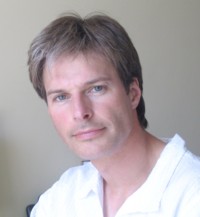
Simon Bovey |
2. Are you a science fiction fan and if so what authors do you read/movies do you see, etc.
I don't think you could write science fiction, or any genre for that matter, if you didn't have a high regard for it. Which is an intellectual way of saying "hell yes, I'm a fan." The cannon is huge and the ideas are the big ones, God, dying, the nature of existence. Wonderful meaty stuff.
I'm pretty terrible at remembering authors' names but I think among my favourites are Phillip K Dick, John Wyndham - how could an Englishman working in sci-fi not love Wyndham - Ballard, H.G Wells, Brian Aldiss. There's a terrific book by John Christopher called The Death of Grass which was an influence on me. Got all that "environmental, we?re doomed" intrigue before Ballard. |
Oh, and pioneering screenwriter Nigel Kneale, best known in the UK for the Quatermass TV serials and films was seminal. Thirty odd years after those programmes were made they?re still influential. Good writing never ages.
As for movies, well I see pretty much everything I can, regardless of genre. Some science fiction that I particularly loved was Minority Report ? great look, Code 46 ? great mood, Spiderman - great story. You know I could go on and on and on. Essentially I hunger for story, great characters that ring true and a theme that rises naturally through the telling.
| 3. What are you working on at the moment - or have planned for the future?
Ah well, that?s a good question. I have a new series for BBC7 called Slipstream which will broadcast in February 2008. It?s set in 1945 when the Allies' victory in Europe is a forgone conclusion and everyone is fighting for a piece of the spoils. And then the UFOs are sighted. Part political thriller, part war story, part future shock.
I?m also working on a feature film adaptation of my own series Cold Blood. It?s a little bit different to the radio series though. There were events, issues and character development I missed a trick on when I first wrote it that I need to go back and deal with. Plus I love the end, a man sacrificing everything he is for an idea. And it?s set in a mythic landscape, the last great wilderness, the most hostile environment on earth ? it cries out for a cinematic treatment. Other than that well, every writer worthy of the name has so many irons in the fire he can?t see the fire. |
Cold Blood
Antartica, the most pristine environment on Earth.
But in 2014 it?s gold rush country.
Biotechnology companies have raced to exploit the secrets
of life in a cold climate. The lure of lightning in a bottle.
Someone?s captured it.
And to survive it?s now necessary to kill a friend.
|
4. For both Voice of God and Cold Blood:
1) Where did you get the idea from
| Cold Blood suggested itself from an article I read about the threat to Antarctica from companies bio prospecting for new enzymes and chemicals for use in industry. The end result would be a continent on which nothing decays, nothing rots, would become polluted, forever. I wondered then how a certain kind of person would react to that.
Voice of God had a more complicated genesis but one that was very organic. The producer/director I work with in radio, Marc Beeby, is an Australian, so I thought it would be a lot of fun to do something based there. I wanted to write about an ultimate weapon but they were all taken, lasers, atom bombs, plagues you name it.
|
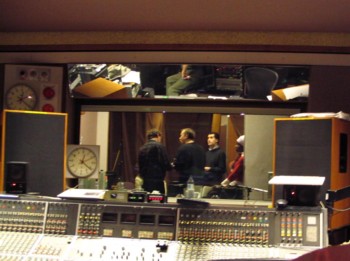
Recording Cold Blood |
Then I remembered in the Tintin book, The Calculus Affair, a childhood favourite, Professor Calculus is working on a sound weapon, an acoustic cannon. I googled acoustic weapons and got an avalanche of pages ? this technology really exists and was used in the Gulf. It grew from those beginnings.
2) What research did you have to do for each program
Heaps. No really, lots and lots of research. I love research. It?s work without working. As a writer you have to know your world as God knows this one. And knowledge of your world helps you come up with scenes, details, dialogue that says to an audience ?this is real, authentic?. The more research you do, the more it soaks into your work like moisture ? don?t force it ? and the better it becomes. The more rounded and complete.
Voice of God was very strange in that way, the more I learnt about Australia and sonic weapons and aboriginal belief the more they interlinked and resonated. It was actually very, very spooky. None of the myths quoted in it were invented. The Bunyip a mythical beast of aboriginal lore really does stun with a bellow like the weapon they?re developing, and the lightning brothers did fight at Maralinga which really does mean "Field of Thunder".
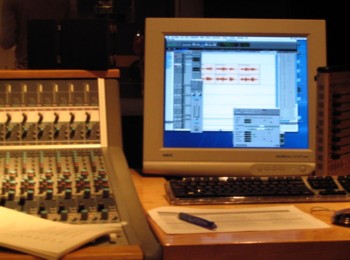
Recording Cold Blood |
Most bizarrely of all after I had the title and events I learnt that the aboriginal for ?bullroarer?, an instrument heard in the series, actually means ?voice of god?. How weird was that! It felt like someone was trying to tell me something. That?s when writing feels special, feels bigger than you and that you?re connecting into something that you can?t really comprehend. And I don?t mean that to sound esoteric, though I know it does, but story and myth are all closely linked to our collective unconscious. The archetype of the hero for instance is broadly a constant from The Odyssey to Beowulf to The Arabian Nights to Red Indian lore to the films of Sergio Leone. |
Story is after all just the way man has learnt to understand his world and why he?s here. Equipment for living. Sometimes a writer can feel that energy flowing through him. And if I knew how to tap that elusive source I?d make a fortune!
3) How do you go about writing a 5-part radio play? What is your general writing procedure?
Panic. Believe it can?t be done. Then settle down and just start. No, seriously, I have to submit a 6 page outline. That?s a page with the setting, the problem and the characters, then a page for each of the episode outlines. Basically that?s the hard work. Once commissioned I?ll flesh this out into a fuller step outline that?s for my eyes only. I write the scripts from that.
From first draft to final draft of all 5 scripts takes about 2 months. And I?m pretty much a 9 to 5 writer, that?s my discipline. Clock in, write as much as I can then clock out. The series is written in one go then Marc and I will go through it, discuss changes. Then I?ll rewrite and this takes maybe a month. There?s always a polish or two after that which is another day or two.
4) How was each program produced - did you approach the BBC with the idea or did they commission it? How long did they give you to finish each show.
A writer approaches the BBC with an idea, the outline I mentioned above. You then polish it up with your designated producer/director to take it towards what they call an ?Offers Round?. The ideas are then given to the commissioning editor (s) and you wait about 2 to 3 months to hear if you?ve been awarded a commission. If you have then delivery time of the script varies but it?s usually about 8 to 10 months in my experience.
5) Marc Beeby directed each. Do you choose your production people for each show, or the actors?
| IActually I was working with another producer initially but wasn't really moving forward, Marc was sharing an office with this producer I believe and read some of my treatments, liked them, rang me, and the rest went from there. We gelled immediately, well he might tell you different but I think we did. It's a terrific working relationship which is very important to me. We share much the same sensibilities about how a drama should be pitched and played. Same sense of humour and qualitative thresholds.
It's very much a collaboration between us when it comes to refining the script and it's actually a process that I look forward to very much. I know some writers have problems with feedback but for me it's the most exciting time, rewriting, moulding, improving what you've got. I?m never actually given a say in the choice of actors but he's very good at casting and always assembles a group of people with an exciting dynamic.
6) Are you present when the programs are recorded?
Yes. There are always moments in the studio when you can hear things aren't working as you thought they would or an actor is having trouble with a line the way you've written it. These things need to be attended to by someone. Sometimes it's not clear how you meant a line to be delivered, for instance with a degree of sarcasm or humour, and being Johnny on the spot means these questions, cuts or additions can be done quickly and done in a way you'd want them to be.
It?s also very exciting, why wouldn't you want to be there. Personally I love taking part. |
The Un-gone
It is upon the flaws of man not the laws of nature
that the thread of our existence hangs.
Matter transporters are a reality, and the Trans-Trip Corporation, controllers of this technology, provide the gateway to a new life for Julian Salinger and his wife Maya. But this apparent golden age of travel without boundaries has its shadow side. And when the system malfunctions, Salinger discovers a less palatable future behind the corporate facade.
An intriguing science fiction thriller. If individuality makes a person special, what happens when that is no longer unique?
|
I have a bit of a running joke in my BBC7 series where I play a character called Joel. In Cold Blood he died horribly with his throat ripped out, but that was such fun to do with the aid of a glass of water, like a strangled gargle. Marc did me the great honour of awarding me a credit as a cast member on Voice of God. One that I didn't deserve, I?m really just noises off, but I'm proud of it. All writers are great actors when seated at their desks the rest of the time this latent thespian sits brooding desperate to get out.
7) How long does it take to record each episode - is the whole thing recorded in a couple of days or once a week, etc.
We get 5 days to record the whole series. A half-hour episode a day. So it's running to keep up from the start. But I think it?s an energy that comes out in the drama. I've written afternoon and Saturday plays for Radio 4 and they get the benefit of 2 days to record a 45-minute or 1 hour play. It's all down to programme budget.
5. The Ungone
Where did you get the idea from
Stuck in an airport departure lounge, delayed because of fog. People were wondering around staring at the same rubbish in the same shops over and over, glazed and dopey, and I quipped to my travelling companion that we were the un-gone, rather like the un-dead in zombie movies.
We then discussed how much better travel would be if someone could come up with a matter transporter machine like the one in Star Trek. But then knowing mankind it was bound to have bugs in it and we?d all end up like Seth Brundle in The Fly or, I suggested, duplicated. And ?Bing!? Seemed like a good idea for a film.
What research did you have to do for each program
Well not too much for this actually. It was set in the future and as such was just a flight of imagination. I created the world so there wasn't much need for research. The set design was what took up the most work. The actual transport was based on the technology of medical scanners so both the Art Director and I worked through a number of looks before deciding on the one we thought was right.
How do you go about writing it?
Piece of paper, pen and a table. Okay I didn't mean to sound flippant but I?m not far off. You have an idea and start setting it down. It developed through about twelve drafts.
Did you cast the actors?
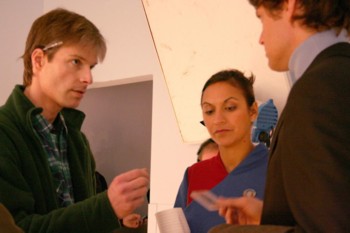
Recording The UnGone 8 minute movie |
Yes, I cast the actors this time. I worked with a casting director to assess who might be right and who was available and then we drew up a shortlist that we invited to an audition in London in this revolting pokey little basement room in an arts centre. Hardly a salubrious start.
But we met some terrific people and I think chose four outstanding actors. As soon as they walked into the room you knew they worked. Talking with them just confirmed that. |
Always cast by gut I say - who you feel is right not who you think is right. Incidentally Stephen Billington was in Resident Evil and Damien Thomas is perhaps best known for his work for Hammer Films, most notably the cult classic Twins of Evil.
Can you share any anecdotes on directing The Ungone.
Well, our location was a disused Victorian city hospital, damp and very cold as we were shooting in December, and far from comfortable. We had to make it look like mid 21st century Kuala Lumpur. So the art department and I spent about three weeks there cleaning, painting and building to make it look like a futuristic transport hub come airport. We got colds and chilblains even though we were wearing about five layers of warm clothing. Then on the first day of shooting the chief electrician turned up wearing shorts! No dress sense at all.
| What has its reception been at movie festivals?
Brilliant. It's had a great reception and has already won a prize, second place Jury Prize at the Seattle Science Fiction Short Film Festival. So far it's played in the UK, Italy, Sweden and Hollywood with a number of other European dates coming up soon. It?s really only started so look out for it at a film festival near you.
Your site doesn't mention Iceman, however - which is mentioned on the 4Talent page - is it a science fiction program?
No, Iceman is a crime thriller about the first use of forensic science |
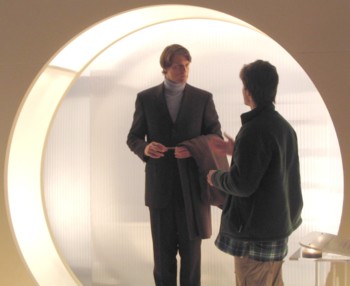
Recording The UnGone 8 minute movie |
by the British police in the 1850s. Essentially its Victorian CSIs out to catch a serial killer. Dark and, I think, rich with the feeling and atmosphere of the times. It goes out on BBC Radio 4 in January of 2008 so please look out for it and tell me what you think.
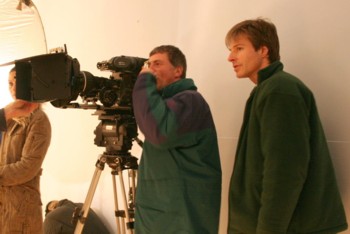
Recording The UnGone 8 minute movie |
I should stress that I don't just write science fiction, I write in a lot of other genres as well. My radio work for instance has included drama, coming of age stories and a period romantic thriller. For film and television I've also written drama and a period romance. As a script doctor I've worked on films ranging from comedy to children?s fantasy. The primary motivator is story. That?s really all that matters.
At the moment I find that a lot of the characters or themes I'm interested in happen to fit better in a different world, off kilter, a shadow world to the ones we inhabit. Science fiction tends to fit that bill. |
Is there anything I haven't asked you that you'd like to address?
No you?re very thorough. It's been an honour and a privilege and I think you have a great website. Radio drama is a great medium, you can listen to it anywhere, do anything and it doesn't cost anymore than staying in one room. So anything that spreads the world and helps both myself and other BBC7 writers reach a wider audience is to be praised and supported. Thanks for being there - and reading this far.
 |
Click on the icons for new features in The Thunder Child.
Radiation Theater: 1950s Sci Fi Movies Discussion Boards
The Sand Rock Sentinel: Ripped From the Headlines of 1950s Sci Fi Films
|
 |
|




|
